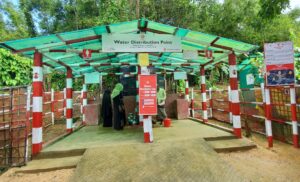
The Ministry of Foreign Affairs of Japan (MOFA) conducts policy and program-level ODA evaluations (third-party evaluations) to improve the management of Official Development Assistance (ODA) and ensure accountability to the public.
In FY2023, MOFA commissioned IDCJ to conduct an evaluation of Japan’s ODA policy and implementation related to support for refugees and refugee-hosting countries. The number of forcibly displaced persons worldwide reached 100 million in 2022 for the first time in history. Japan’s refugee-related assistance has been provided based on the “Humanitarian Aid Policy of Japan” formulated in July 2011, and with the perspective of “Humanitarian-Development-Peace Nexus (HDP nexus),” which was not specified at the time the policy was formulated. Japan’s refugee assistance policies are also illustrated in its speeches and announcements at relevant international conferences.
In addition to document review and interviews with relevant stakeholders, IDCJ conducted field visits in Uganda and Bangladesh as case studies to evaluate the relevance of policies, the effectiveness of results, and the appropriateness of processes, as well as to evaluate the policies from diplomatic viewpoints. Based on the results of the evaluation, IDCJ made recommendations to improve the planning and implementation of future assistance in this area. The evaluation results are published on the ministry’s website.

In response to the earthquake in Nepal in April 2015, the Japanese Red Cross Society (JRCS) carried out emergency medical relief activities in the Sindhupalchok District, which suffered particularly severe damage. Furthermore, JRCS implemented the Nepal Earthquake Recovery Programme, mainly targeting the Sindhupalchok District and consisting of seven projects, namely, shelter; health; water, sanitation and hygiene promotion (WASH); livelihoods; school-based disaster risk reduction; blood service; and the Nepal Red Cross Society (NRCS) capacity building.
As some of the projects were to end in June 2019, JRCS commissioned IDCJ to evaluate the programme in alignment with the evaluation framework of the NRCS and the International Federation of Red Cross and Red Crescent Societies. The purposes of the evaluation were: 1) To conduct the final evaluation of the four projects ending in 2019 and contribute to the effective implementation of future reconstruction projects; and 2) To conduct the mid-term evaluation of the three projects ending in March 2020 and make recommendations for effective and smooth project implementation.
In order to convey Japan’s unique experiences, JICA conducts the Knowledge Co-Creation Program in Japan for relevant parties from developing countries to come to Japan and learn by actually immersing themselves in Japanese society and organizations. In FY2020, JICA launched a new issue-specific training course on the design, implementation, and system building of project evaluation for government officials from developing countries and commissioned IDCJ to carry out the course. The program has been ongoing since then.
Due to COVID-19, the program was conducted online from FY2020 to FY2022. From FY2023, it has been conducted in a hybrid format that combines remote sessions and visits to Japan. 59 people have participated in this program from FY2020 to FY2024. (Participating countries: Fiji, Marshall Islands, Solomon Islands, Papua New Guinea, Indonesia, Vietnam, Cambodia, Thailand, Bangladesh, India, Mauritius, Madagascar, Palestine, Moldova, Ukraine, Somalia, Egypt, Botswana, Zimbabwe, Ghana, Gambia, Nigeria, Mexico, and Grenada)